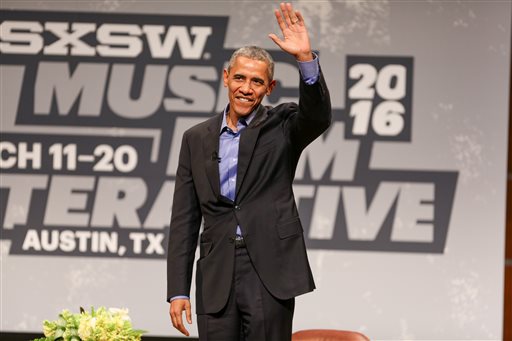By Kristen Santer

The South by Southwest Festival (SXSW) kicked off this past week in Austin, Texas, featuring the year’s latest and greatest in film, music, gaming and technology. President Obama made history as the first president to serve as the keynote speaker who opens the festival. Despite being 30 minutes late, President Obama’s speech was immensely successful. He highlighted perhaps one of the easiest, but most important issues facing the United States in an increasingly digital age: a lack of civic engagement, especially among the younger generations.
Although President Obama glossed over many important topics, he consistently spoke about incorporating technology and politics to increase civic engagement.
Evan Smith, editor-in-chief of the Texas Tribune, interviewed the president, and the first question he asked Obama was, “What is the reason for you being here in Austin?” President Obama immediately responded, “I’m here to recruit all of you.” He griped a little bit about how the government gets a lot of the blame for not fixing daunting problems like racial inequality and immigration.
Obama is right in that it is easy to blame the government, and the blame is often justified. But he also put the spotlight on us as voters, and made a direct accusation that some of this blame is shared: “The most important office in a democracy is the office of the citizen, and right now with all the talent that’s out there, our government is not working as well as it should. The only way we’re going to solve that is by getting citizens involved in ways we haven’t.”
And it is true. According to FairVote, voter turnout for presidential elections has increased slightly in the past few years, reaching an average of around 58.2 percent in 2012. However, voter turnout for midterm elections was a dismal 35.9 percent in 2014, and has rapidly decreased in the past few elections.
Unfortunately, many people use their dissatisfaction with the government as a reason to become less involved. Voters ask despondent questions and make futile statements like
“What is the point?” and “It will not change anything.”
The increasingly polarized party politics emerging only solidifies the fact that, if anything, government’s inadequacy should encourage people to vote and to become more involved in the political system.
An easy way to increase voter turnout and civic engagement is to digitize many governmental processes and abilities. President Obama mentioned that government agencies like the Internal Revenue Service (IRS) and the Department of Motor Vehicles (DMV) are online, but something as simple as voting is not. Think about how many more people would vote if they did not have to leave their homes.
Although the government and technology constantly seem to be at odds, especially with the current FBI versus Apple case, it is possible for our generation to bridge this gap. It is very fitting that Obama chose to save this important speech for the SXSW, which debuts some of the brightest minds and newest technologies. Bringing government into the 21st century should not only be shouldered by the bureaucrats, but also the generation and new talent that have spent their lives studying it.
An example of politics and technology combining to serve a college-aged audience, is the app Countable. The revolutionary app asks everyone who their representatives are based on state, and then you vote on bills currently on the floor. Countable takes this vote and sends it to your respective representative so your opinions get voiced. It is these types of changes that can get more young people involved in politics and increase general civic engagement.
Whether you want to run for office or simply get out and vote, there is a way for everyone to become more involved in politics. Radical politicians like Donald Trump and Bernie Sanders have increased voter turnout already, especially among the younger generation.
According to Time, 84 percent of voters under 30 voted for Bernie Sanders in the Iowa primary earlier this year. Even if you dislike all of the candidates you can still be involved. I urge everyone to register while they still can.
Kristen Santer, FCRH ’17, is a Communication and Media Studies major for Stanford, Connecticut. She currently serves as The Fordham Ram‘s Opinion Editor.









































































































































































































